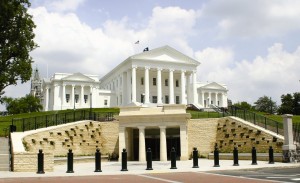 By Kristen Smith
By Kristen Smith
Capital News Service
Legislation that would grant a provisional state teaching license to Teach for America participants is moving toward passage in the Virginia General Assembly.
Both the House of Delegates and Senate have unanimously approved separate bills to create such a license to help the program, which recruits college students to teach in low-income areas across the country.
House Bill 2084 recently was passed by the House and has been assigned to the Senate Committee for Education and Health. The bill, proposed by Del. M. Kirkland Cox (R-Colonial Heights), is in line with education initiatives advocated by Gov. Bob McDonnell (R).
Since 1990, Teach for America, a New York City-based nonprofit group, has recruited more than 33,000 recent college graduates throughout the country to work in low-income areas. Virginia does not have a Teach for America program, but McDonnell said he wants one as part of his education agenda.
Cox, a retired high school government teacher and the majority leader in the House of Delegates, recalled the struggles of starting his teaching career in a hard-to-staff school. He said bright, young, energetic teachers from Teach for America can transform classrooms and close the achievement gaps among students in poverty-stricken areas.
“Teach for America recruits are often in the top 10 percent of their college classes or hold student leadership positions,” Cox said. He noted that Teach for America participants undergo intense training.
HB 2084 would create a two-year provisional license in Virginia for Teach for America participants. It also would allow the Virginia Board of Education to extend that license for an additional year if the participant has met certain criteria. They include satisfactory scores on teachers’ assessments and satisfactory evaluations at the end of the school year.
Sen. Frank M. Ruff Jr. (R-Clarksville) has filed identical legislation in his chamber.
Senate Bill 1175 was approved by the Senate last week and referred to the House Education Committee. On Wednesday, that committee approved the bill, 21-0. It now goes to the full House for a vote.
 By Kristen Smith
By Kristen Smith
Capital News Service
Legislation that would grant a provisional state teaching license to Teach for America participants is moving toward passage in the Virginia General Assembly.
Both the House of Delegates and Senate have unanimously approved separate bills to create such a license to help the program, which recruits college students to teach in low-income areas across the country.
House Bill 2084 recently was passed by the House and has been assigned to the Senate Committee for Education and Health. The bill, proposed by Del. M. Kirkland Cox (R-Colonial Heights), is in line with education initiatives advocated by Gov. Bob McDonnell (R).
Since 1990, Teach for America, a New York City-based nonprofit group, has recruited more than 33,000 recent college graduates throughout the country to work in low-income areas. Virginia does not have a Teach for America program, but McDonnell said he wants one as part of his education agenda.
Cox, a retired high school government teacher and the majority leader in the House of Delegates, recalled the struggles of starting his teaching career in a hard-to-staff school. He said bright, young, energetic teachers from Teach for America can transform classrooms and close the achievement gaps among students in poverty-stricken areas.
“Teach for America recruits are often in the top 10 percent of their college classes or hold student leadership positions,” Cox said. He noted that Teach for America participants undergo intense training.
HB 2084 would create a two-year provisional license in Virginia for Teach for America participants. It also would allow the Virginia Board of Education to extend that license for an additional year if the participant has met certain criteria. They include satisfactory scores on teachers’ assessments and satisfactory evaluations at the end of the school year.
Sen. Frank M. Ruff Jr. (R-Clarksville) has filed identical legislation in his chamber.
Senate Bill 1175 was approved by the Senate last week and referred to the House Education Committee. On Wednesday, that committee approved the bill, 21-0. It now goes to the full House for a vote.


